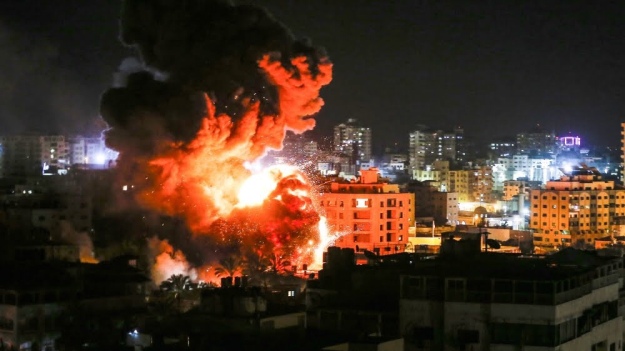By Iyad Abuheweila and David M. Halbfinger
Nov. 14, 2019
DEIR El-BALAH, Gaza Strip — Ismail al-Swarka was shaken from slumber after midnight on Thursday by what sounded like four missile blasts. Then he heard his neighbors screaming. What he found outside was horrifying: Eight of his relatives, including five children, had been killed in an airstrike, with several more badly wounded.
As the sky brightened into morning, the Israeli military’s Arabic-language spokesman posted on Twitter the photo of a Palestinian Islamic Jihad commander it said had been killed in the strike, which occurred just hours before a cease-fire ended two intense days of fighting between Israel and the militant group.
But Islamic Jihad says the man in the photo was actually a different commander from Rafah, at the southern end of the Gaza Strip, who is still alive — and that the victims of the attack in Deir El-Balah, near the center of the coastal enclave, were all civilians.
On Friday, Israel’s military backtracked on its earlier claim and said it had begun an investigation into the harm to civilians in the Gaza strike.
Gaza health officials said 16 civilians were among the 34 Palestinians killed in the two-day round of combat, which began when Israel assassinated an Islamic Jihad commander early Tuesday, and escalated as the militant group responded with hundreds of rockets aimed at cities and towns across southern and central Israel. There were no Israeli fatalities.
Israel’s military asserted that it was conducting its strikes with precision, and it seemed that way at first: The leader targeted on Tuesday, Baha Abu al-Ata, was killed when a missile hit his third-floor bedroom. His wife was also killed, but their children, in another room, survived. Israel also pointed repeatedly to airstrikes that it said had killed militants in the act of firing or preparing to fire rockets but had kept collateral damage to a minimum.
But the military says civilian casualties are unavoidable in Gaza’s teeming neighborhoods, where militants often fire rockets from residential areas. Israel accuses militants of using civilians, including their own relatives, as human shields against retaliatory strikes.
The eight al-Swarka family members killed appear to have accounted for half the civilian death toll in one devastating strike.
The Israeli military continued to insist on Friday that it had struck “an Islamic Jihad military infrastructure” in the Deir el-Balah attack. “According to the information available” at the time, it said in a statement, “no civilians were expected to be harmed as a result.”
Initial information, the military said, “showed that an Islamic Jihad operative was killed in the strike,” apparently the commander of a rocket unit, which it said explained the Twitter post by its Arabic-language spokesman, Avichay Adraee.
But doubts about that information have prompted an investigation into the victim’s “identity, as well as the harm caused to civilians by the strike,” the military said.
Since Hamas seized power in Gaza in 2007, Israel has fought three wars and dozens of skirmishes against Islamic militant groups. While the wars have inflicted heavy damage on Hamas and the smaller Islamic Jihad group, hundreds of civilians have also died in Israeli airstrikes.
The high civilian death toll has drawn heavy international criticism, and the International Criminal Court in The Hague has opened a preliminary investigation into Israel’s battlefield tactics. Israel has rejected the criticism, saying it takes numerous precautions to prevent unnecessary civilian casualties.
It says its targets are based on sophisticated intelligence and cleared by legal advisers and other experts, and that it often warns inhabitants to evacuate before their homes are struck.
Palestinian militants also have been denounced for firing rockets at Israeli civilian areas.
On Friday afternoon, it was hard to see the remains of any structure, let alone infrastructure, at the site of the Thursday airstrike. All that was left of the al-Swarka family’s two homes, which had been about 50 yards apart, were shards of two tin shacks strewn across giant craters in the sand.
Neighbors told The Associated Press that an Islamic Jihad commander had lived in one of the destroyed homes, but that he wasn’t home at the time of the airstrike.
But Ismail al-Swarka, the brother of one of those killed, gave a different account.
One of the destroyed homes, he said, belonged to Rasmi Abu Malhous, who sometimes used the surname al-Swarka, the name of their populous Bedouin tribe. He received a police officer’s salary from the Palestinian Authority, though like many others on the payroll of the authority, idled years ago in Gaza for political reasons, he did not actually put on a uniform and go to work.
One of Mr. Abu Malhous’s two wives, Mariam, was killed, Ismail said; the other, Wissam, survived. Three of his children were killed.
In the other home lived Mohammad and Yousra al-Swarka, Ismail’s sister.
Mohammad works for Palestinian Islamic Jihad but in a civilian capacity, the group said, mediating disputes between families and performing other social functions.
“Why are the children killed if the Israeli army has a problem with someone?” asked Dawood Shihab, an Islamic Jihad spokesman.
Yousra was killed in the blast, her brother said, along with two of the family’s six children.
Ismail al-Swarka said the Israelis gave no warning before firing on his relatives’ homes. After he rushed outside after the airstrike, he said he was disoriented by what he found. “It was unrecognizable,” he said. “I didn’t know what to do.” He found one nephew’s body at the edge of a crater. Then a neighbor stumbled across an adult’s body.
“It was my sister,” he said. “I helped dig her body out of the sand.”
Mohammad al-Swarka remained in critical condition on Friday at a local hospital.
Ismail al-Swarka said his brother-in-law was also a goatherd and owned some chickens and a donkey cart. The smaller animals were blown to bits. The donkey was injured but survived.
Iyad Abuheweila reported from Deir el-Balah and David M. Halbfinger from Jerusalem.
No comments:
Post a Comment